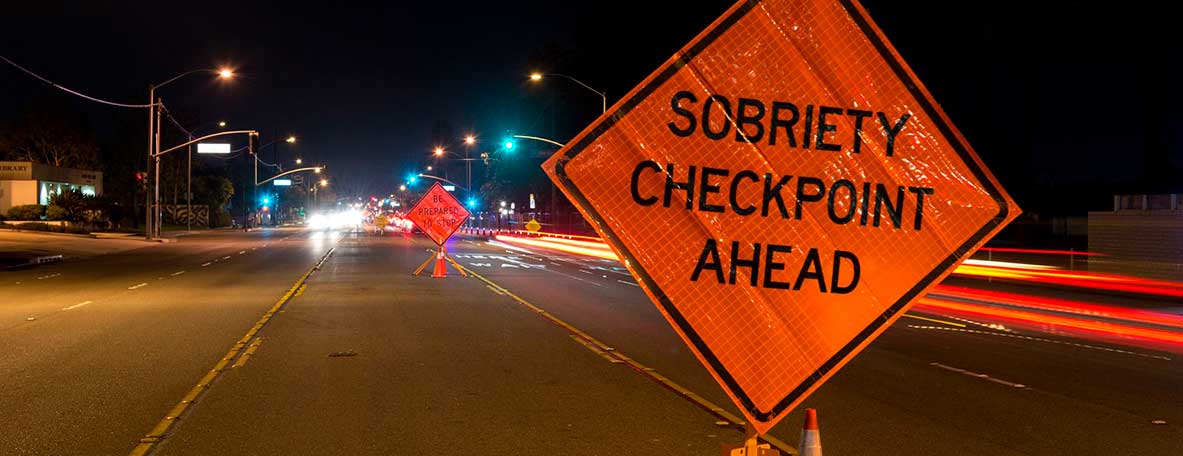
- October 21, 2016
- CLLB Law
- Criminal Defense
According to Mothers Against Drunk Driving (MADD), the annual cost of alcohol-related crashes to society is over $132 billion. In an effort to deter people from driving under the influence (DUI), many law enforcement agencies use sobriety checkpoints. While reducing alcohol-related wrecks is a worthy goal, that goal cannot infringe on the rights of drivers. There are specific ways that road blocks must be conducted in order to be legal. Generally, they must be publicized in advance, officer discretion must be eliminated as much as possible, and chemical tests cannot be conducted unless the officer has probable cause to believe a driver has been drinking.
Back in 1990, the Supreme Court ruled that sobriety checkpoints are constitutional because the “degree of intrusion” they placed on drivers was overwhelmed by a compelling state interest in saving lives. The average stop time is about the length of a cycle at a traffic light, so the inconvenience is minimal. Regardless, 12 states have determined that sobriety checkpoints violate their own constitutions and are prohibited.
These police traffic stops are permitted in both Indiana and Kentucky. The Indiana Supreme Court has ruled that if there is a legitimate public safety rationale for a roadblock’s existence, a sobriety checkpoint can be held. Such rationale can be proven through evidence that the suggested location is one frequented with drunk driving activity. The checkpoint also must be conducted in an objective, non-discretionary fashion. One of the ways that is commonly accomplished is by stopping vehicles in a specific sequence, such as every other vehicle or every fifth vehicle.
Just last year, the Kentucky Supreme Court affirmed the use of four general guidelines for law enforcement to ensure that Kentucky DUI checkpoints were constitutional:
- Decisions regarding location, time, and procedures governing checkpoints should be determined by supervisory law enforcement officers, rather than field officers. Locations should be chosen so as not to affect public safety and should have some reasonable relation to the conduct that law enforcement is seeking to limit.
- Law enforcement officials working the roadblock should comply with the procedures established by their superiors so that each motorist is dealt with in the same manner.
- The nature of the checkpoint should be readily apparent to approaching motorists. At least some of the field officers should be in uniform and with marked patrol cars. Warning signs are also advisable.
- The length of the stop is an important factor in determining the intrusiveness of the roadblock. Motorists should not be detained any longer than necessary to perform a cursory examination so as to look for signs of intoxication or to check for license and registration. If the officer has a reasonable suspicion that the motorist violated the law, the motorist should be asked to pull over, so that other motorists may proceed.
Every case has unique circumstances, and the facts of your case may reveal improper police procedure as to the time, place, and manner in which a roadblock was conducted.
If you have any questions about this topic or about your constitutional rights during a sobriety checkpoint, you can find out more by discussing it with one of the criminal defense attorneys at Church, Langdon, Lopp, Banet Law. We have years of experience helping people, and we can help you. Based in New Albany, Indiana, we proudly serve communities throughout Kentucky and Indiana, including, but not limited to, Jefferson County, KY; Floyd County, IN; Clark County, IN; and Harrison County, Indiana. Contact us by calling (812) 725-8224 or by using our online form.

Attorney Marc Tawfik
Marc is a Kentucky native, having lived and worked in the state the majority of his life. He is a licensed attorney in Kentucky and Indiana, and his focus is on trial work, including civil litigation and criminal defense. He has represented a wide variety of clients, and he is committed to putting his clients’ needs first. [ Attorney Bio ]

